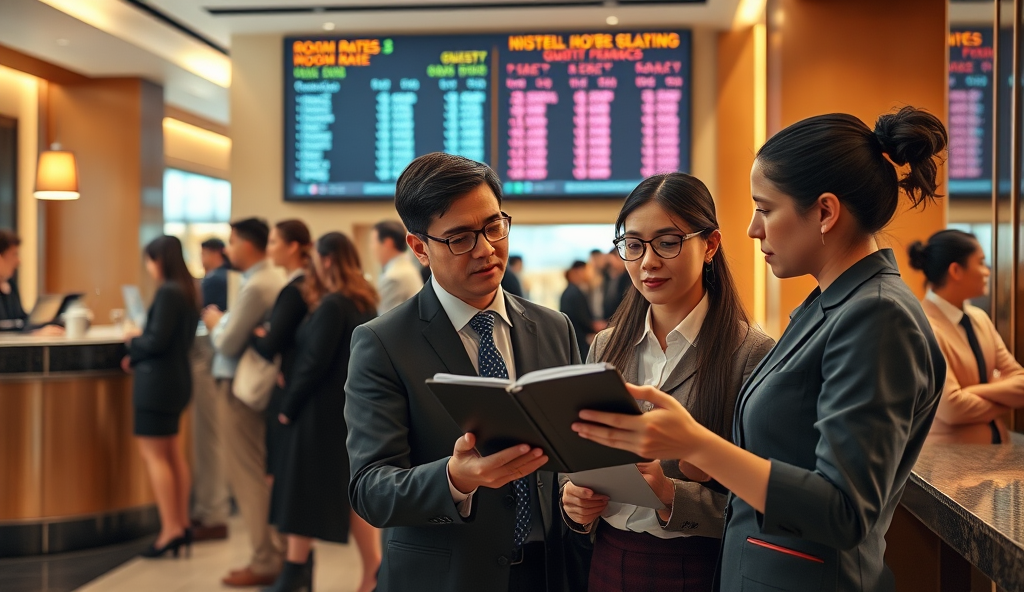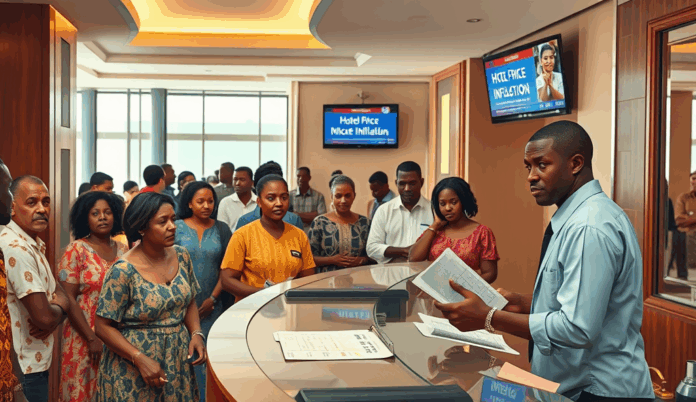Introduction to Hotel Price Inflation in Nigeria
Hotel price inflation in Nigeria has become a pressing concern for travelers, with accommodation costs rising by 22% year-on-year in major cities like Lagos and Abuja. This surge has significantly impacted travel budgets, forcing tourists to either reduce trip durations or opt for lower-tier accommodations.
Factors such as currency devaluation and increased operational costs have contributed to rising hotel rates in Nigeria, particularly in high-demand areas like Victoria Island and Ikoyi. For instance, a standard 4-star hotel room in Lagos now averages ₦85,000 per night, up from ₦65,000 just two years ago.
Understanding these price trends is crucial for travelers planning Nigerian trips, as budget adjustments may be necessary. The next section will explore the root causes behind these hospitality price increases in greater detail.
Key Statistics

Understanding the Causes of Hotel Price Inflation in Nigeria
Hotel price inflation in Nigeria has become a pressing concern for travelers with accommodation costs rising by 22% year-on-year in major cities like Lagos and Abuja.
The 22% year-on-year surge in Nigerian hotel prices stems from multiple economic pressures, including the naira’s 40% depreciation against the dollar since 2022, which has increased import costs for hospitality essentials like linens and kitchen equipment. Hotels in Lagos now spend 35% more on diesel for generators due to unreliable grid power, with Ikoyi properties reporting ₦15 million monthly energy bills.
Operational costs have compounded with rising staff wages (up 18% since 2021) and security expenses in high-demand areas like Victoria Island, where armed guards now cost ₦250,000 monthly per property. Tourism demand also plays a role, as international arrivals to Lagos grew 27% post-pandemic while room inventory increased only 9%, creating supply imbalances.
These factors collectively explain why a Lagos 4-star hotel now charges ₦85,000 nightly, with luxury properties like Eko Hotels seeing 30% rate hikes since 2020. The next section will examine how these rising hotel rates in Nigeria are reshaping traveler spending patterns and trip durations.
Impact of Hotel Price Inflation on Travel Budgets
The 22% year-on-year surge in Nigerian hotel prices stems from multiple economic pressures including the naira's 40% depreciation against the dollar since 2022.
The 22% surge in Nigerian hotel rates has forced travelers to allocate 35-50% more for accommodation, with mid-range tourists now spending ₦255,000 for a 3-night Lagos stay compared to ₦180,000 in 2021. Business travelers report cutting conference durations from 5 to 3 days to offset costs, while leisure visitors are opting for shared apartments in emerging areas like Lekki Phase 1.
Families planning week-long vacations face tough choices, as the ₦595,000 current cost for 7 nights in a 4-star hotel could cover return flights to Dubai. Some tourists now prioritize northern destinations like Kaduna where rates remain 18% lower than Lagos, though security concerns persist.
These budget constraints are reshaping Nigeria’s tourism landscape, setting the stage for our next analysis of pre-and post-inflation hotel pricing trends across key cities.
Comparing Hotel Prices in Nigeria Before and After Inflation
The 22% surge in Nigerian hotel rates has forced travelers to allocate 35-50% more for accommodation with mid-range tourists now spending ₦255000 for a 3-night Lagos stay compared to ₦180000 in 2021.
A detailed comparison of Nigeria’s hotel pricing reveals stark contrasts between pre-2021 rates and current figures, with Lagos experiencing the steepest hikes at 22% for mid-range properties. Abuja’s 4-star hotels now average ₦85,000 nightly, up from ₦62,000 in 2021, forcing corporate travelers to shorten stays or downgrade accommodations.
Leisure destinations like Calabar show a 15% increase, pushing beachfront resorts from ₦45,000 to ₦52,000 per night, while budget hotels in Enugu jumped from ₦18,000 to ₦25,000, disproportionately affecting backpackers. Northern cities like Kano maintain relatively stable rates due to lower demand, though inflation still drove a 12% rise since 2021.
These disparities highlight how Nigeria’s hotel price inflation varies by region and class, setting the context for examining which areas face the most severe impacts. The next section explores the geographical distribution of these cost surges and their implications for travel planning.
Regions in Nigeria Most Affected by Hotel Price Inflation
Lagos remains Nigeria’s hardest-hit region with luxury hotels along Victoria Island now charging ₦120000 nightly—a 30% surge since 2021—due to high demand from business travelers and limited premium inventory.
Lagos remains Nigeria’s hardest-hit region, with luxury hotels along Victoria Island now charging ₦120,000 nightly—a 30% surge since 2021—due to high demand from business travelers and limited premium inventory. Abuja follows closely, where political activities and international conferences have pushed 5-star hotel rates beyond ₦150,000, pricing out mid-tier corporate clients.
Coastal leisure destinations like Calabar and Port Harcourt face compounded pressures, as beach resorts now demand ₦65,000 peak-season rates—a 40% premium over 2021 prices—while limited alternatives force tourists to absorb costs. Even secondary cities like Enugu and Owerri report 18-20% hikes as infrastructure projects increase business travel demand.
Northern cities exhibit milder inflation (10-12%), though Kaduna’s security challenges have paradoxically raised hotel prices by 15% as operators offset risk premiums. These regional disparities necessitate tailored budgeting strategies, which we’ll explore next for cost-conscious travelers.
Tips for Budgeting for Hotel Stays Amid Inflation
Nigeria’s hotel pricing trajectory remains tied to macroeconomic instability with analysts projecting 12-15% annual increases through 2025 as VAT policies and forex volatility persist.
Given Nigeria’s regional price disparities, travelers should prioritize booking midweek stays in Lagos or Abuja, where rates drop by 15-20% compared to weekends, according to recent industry data. For coastal destinations like Calabar, opting for shoulder seasons (April-May or September-October) can save up to 30% on beach resorts’ peak ₦65,000 rates.
Leverage corporate discounts or loyalty programs, especially in northern cities like Kano, where negotiated rates can offset the 10-12% inflation for business travelers. Budget-conscious tourists should also monitor infrastructure project timelines in Enugu and Owerri to avoid periods of inflated demand.
Consider hybrid stays—combining premium hotels for key business nights with budget options—to balance comfort and cost. As we’ll explore next, alternative accommodations like serviced apartments can further mitigate rising hospitality expenses across Nigeria’s major travel hubs.
Alternative Accommodation Options to Mitigate Costs
Serviced apartments in Lagos and Abuja offer 25-40% savings compared to hotels, with monthly rates averaging ₦450,000 for fully furnished units—ideal for extended stays. Platforms like Spleet and RentSmallSmall provide verified listings with flexible payment plans, addressing budget constraints amid rising hotel rates in Nigeria.
For group travelers, Airbnb’s shared spaces in Calabar and Port Harcourt cost 60% less than beach resorts, with private rooms averaging ₦18,000 nightly during peak seasons. Homestays in cultural hubs like Kano also provide authentic experiences at ₦12,000 daily, often including meals—a strategic counter to increased accommodation costs in Nigeria.
Co-living spaces like Housify in Enugu combine affordability (from ₦10,000/night) with coworking facilities, bridging gaps for digital nomads. As we transition to finding deals, these alternatives demonstrate how travelers can navigate Nigeria hotel industry price trends without compromising comfort.
How to Find the Best Deals on Hotels in Nigeria
Booking directly through hotel websites often yields discounts of 10-15% compared to third-party platforms, especially for chains like Transcorp Hilton or Eko Hotels, which offer loyalty programs with exclusive rates. Travelers can also leverage off-peak seasons (April-June) when Lagos hotels drop prices by 20-30% to counter Nigeria hotel industry price trends during high-demand periods.
Local booking platforms like Hotels.ng frequently list last-minute deals, with Abuja budget hotels offering rooms from ₦25,000 nightly—40% below walk-in rates during economic downturns. Subscribing to hotel newsletters also provides access to unadvertised promotions, particularly useful given rising hotel rates in Nigeria’s major cities.
Government policies significantly influence these pricing strategies, as we’ll explore next regarding tax structures and tourism incentives that shape increased accommodation costs in Nigeria. Timing reservations 6-8 weeks before arrival typically secures optimal rates before seasonal demand spikes.
The Role of Government and Policies in Hotel Price Inflation
Nigeria’s 7.5% value-added tax (VAT) on hospitality services directly contributes to rising hotel rates, with luxury properties in Lagos passing these costs to guests—adding ₦15,000-₦30,000 nightly to premium room rates. Simultaneously, fluctuating foreign exchange policies force hotels to adjust dollar-pegged contracts, exacerbating price volatility during economic downturns.
The 2022 Tourism Development Levy increased operational costs for hotels, particularly in Abuja where compliance costs spiked by 18%, pushing mid-range room rates above ₦50,000. However, states like Cross River offer tax holidays to attract investors, creating rare pockets of affordability in Calabar’s hospitality sector.
These policy-driven cost pressures interact with seasonal demand cycles discussed earlier, setting the stage for Nigeria’s evolving hotel pricing landscape—a trend we’ll analyze next regarding future projections.
Future Outlook for Hotel Prices in Nigeria
Nigeria’s hotel pricing trajectory remains tied to macroeconomic instability, with analysts projecting 12-15% annual increases through 2025 as VAT policies and forex volatility persist—Lagos’ luxury segment may breach ₦250,000 nightly rates while Abuja’s mid-tier hotels stabilize near ₦65,000. Regional disparities will intensify as investment-friendly states like Cross River maintain 20-30% price advantages through tax incentives, though nationwide infrastructure gaps could limit overall sector growth.
The proposed 2024 tourism masterplan aims to streamline levies, potentially easing operational costs for hotels in Lagos and Abuja if implemented, but political will remains uncertain given past policy inconsistencies. Meanwhile, dollar-linked contracts continue driving price fluctuations, particularly during peak travel seasons when demand surges by 40-60% in major cities.
As these economic and policy factors converge, travelers must adopt flexible booking strategies—monitoring exchange rates and seasonal patterns discussed earlier—to navigate Nigeria’s evolving hospitality landscape. This reality sets the context for practical budgeting approaches we’ll explore in our final recommendations.
Conclusion: Navigating Hotel Price Inflation for Your Trip to Nigeria
With rising hotel rates in Nigeria impacting travel budgets, strategic planning is key to managing increased accommodation costs. Consider booking mid-week stays or exploring alternative lodging options like serviced apartments, which saw a 15% price advantage over hotels in Lagos last quarter.
The impact of inflation on Nigerian hotels varies by region, with Abuja experiencing sharper fluctuations than Calabar. Leverage loyalty programs or negotiate extended-stay discounts to offset price hikes, as many chains now offer flexible rates for longer bookings.
While luxury hotel pricing in Lagos remains steep, budget-conscious travelers can still find value by targeting off-peak seasons or lesser-known neighborhoods. Stay informed about Nigeria hotel industry price trends through local tourism boards to make cost-effective decisions for your trip.
Frequently Asked Questions
How can I find affordable hotels in Lagos despite the 22% price increase?
Book directly through hotel websites for 10-15% discounts and target midweek stays when rates drop 15-20% compared to weekends.
Are there alternative accommodations in Nigeria that cost less than hotels?
Serviced apartments in Lagos or Abuja offer 25-40% savings—platforms like Spleet list verified units from ₦450,000 monthly.
When is the cheapest time to visit Calabar to avoid peak hotel rates?
Travel during shoulder seasons (April-May or September-October) to save 30% on beach resorts compared to peak ₦65,000 rates.
Can corporate travelers negotiate better hotel rates in Abuja?
Yes—leverage loyalty programs or volume discounts as many 4-star hotels offer flexible corporate rates below the ₦85,000 average.
What tools help track Nigeria's hotel price trends for budget planning?
Use Hotels.ng for last-minute deals and subscribe to hotel newsletters for unadvertised promotions before seasonal demand spikes.


